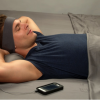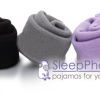
Wound up before sleep?
We all find it hard to wind down sometimes, making it difficult for us to fall asleep. Thankfully, YouTube and other online sources, such as The Dozy Owl, have become a vast library for the non-sleepers, full of audios that might help us to relax. And, if we can relax better, the physiological response from our bodies is more conducive to sleep such as a slowing heart rate and a lower temperature.
What helps you to relax? Is it the sound of rain on your window, the sounds of a fire roaring, or is it someone taking you through a relaxing sensory scene such as a forest or a beach? Is there more participation in the audios you like such as progressive muscular relaxation training where you follow instructions to tense and relax different muscles in your body, or is it breathing techniques? Whatever it is, audio aids can be really helpful for the odd days when winding down feels impossible on our own, and the good news is most of these aids are free online.
There are a few ways to make sure that an audio aid is being used appropriately and not actually perpetuating any sleep issues:
That all light from the device you’re using is not visible or is dimmed to much lower brightness levels than usual so it does not affect our melatonin levels (a sleep hormone). Thankfully due to technology this is achievable these days.
- That the audios we use are short and fulfil a purpose of relaxation – allowing yourself to drift off with an 8 hour audio running in the background may disturb your sleep later on in the night – it can initiate wakefulness as well as sleep. Short audios or timer devices for switching off electronics can be useful here.
- That we are indeed listening to something enjoyable but relaxing – an exciting audio book is not going to encourage sleep – in fact it might ward it off! Researching your audio before sleep time is advisable – everyone is different, so it must be right for you.
- Finding headphones which don’t make ears sore and cause discomfort!
This final point is of particular interest to me as a sleep specialist. When trying to implement strategies to help with insomnia, whilst we don’t actively encourage our patients to rely on external aids, sometimes getting sleep back on track is hard work. Therefore, having audios for the patient to listen to which can aid with relaxation whilst our scientific sleep strategies have a chance to work, can be very helpful. Yet, earphones can be very annoying and you just can’t lie in any way but flat or upright when in bed!
So I did some researching and came across SleepPhones. A neat, and much needed concept of flat ear phones in a comfy band that sits across your head. I decided to investigate by taking two kinds of volunteers to try them, one chap on my insomnia program who has a problem sleeping, and one lady who has no problems sleeping.
Positives
The volunteers both agreed that the SleepPhones were incredibly comfy – like pyjamas for your head (and indeed the company that sells them promotes them as just that). They are soft and don’t compress your ears or head in a way that would encourage pain or discomfort, or for your head to overheat. Both volunteers loved the idea of lying on their side and getting really comfy, and yet not compromising on being able to hear the audio of their choice. The good sleeper described some noise cancellation as being an added (comfier than ear plugs) bonus – her partners snoring became muffled and tolerable and she became aware of how much this would usually affect her sleep, having woken up more refreshed with SleepPhones. The poor sleeper was ecstatic that his movements in bed were reduced to a minimum as he didn’t need to keep taking them on or off in the night when a relaxation audio may be needed. This was helpful for his partner who had suffered with sleep disturbances herself because of this for a long time.
The interesting thing about the good sleeper was that by wearing SleepPhones, it opened up a whole world of relaxation audios she hadn’t explored before, and highlighted when her sleep might not be as good as she thought. On the odd night when she found it difficult to fall asleep, she would spend the time just thinking and worrying about various issues. By wearing ear phones that felt comfy, she was able to use an audio which avoided these thoughts and got her to sleep a lot quicker, and her sleep was of a better quality (which she described by feeling much more refreshed when waking in the morning).
Neither volunteer’s partners reported any sound from the earphones when in bed next to them. The poor sleeper found the SleepPhones a delight to use and encouraged him to stick with some of the sleep strategies he was going through in his insomnia program. The good sleeper realised there was a way to avoid the odd night when she felt very wound up and had difficulties relaxing on her own
Negatives
Feedback was very good in general, with the only negative point being of sound quality. The sleep phones only reach a certain volume, and both volunteers felt that whilst using them for relaxing audios was fine, as neither wanted the sound to be too loud and distracting in bed, using them for other purposes such as listening to instructions or something which requires more attention, may be slightly harder. As a sleep specialist I find this encouraging. The SleepPhones seem to be designed for sleep and not to work against it (having louder sound capabilities could have opposite effects).
All in all to aid relaxation and encourage good sleep quality, ear phones that don’t make your ears sore and a relaxing audio (for me, it’s the sounds of rain) may help encourage sleep when used appropiately. Even as a sleep specialist I am partial to speedy relaxation especially when I’m not on my usual routine – such sleeping on a plane or working away from home. Why not see if you can find a relaxing audio that suits you?
Sleep well sleepyheads!
For more free advice and information on sleeping well, check out the Sleepyhead blog at www.sleepyheadclinic.co.uk or @sleepyclinic for daily advice on sleep.




















